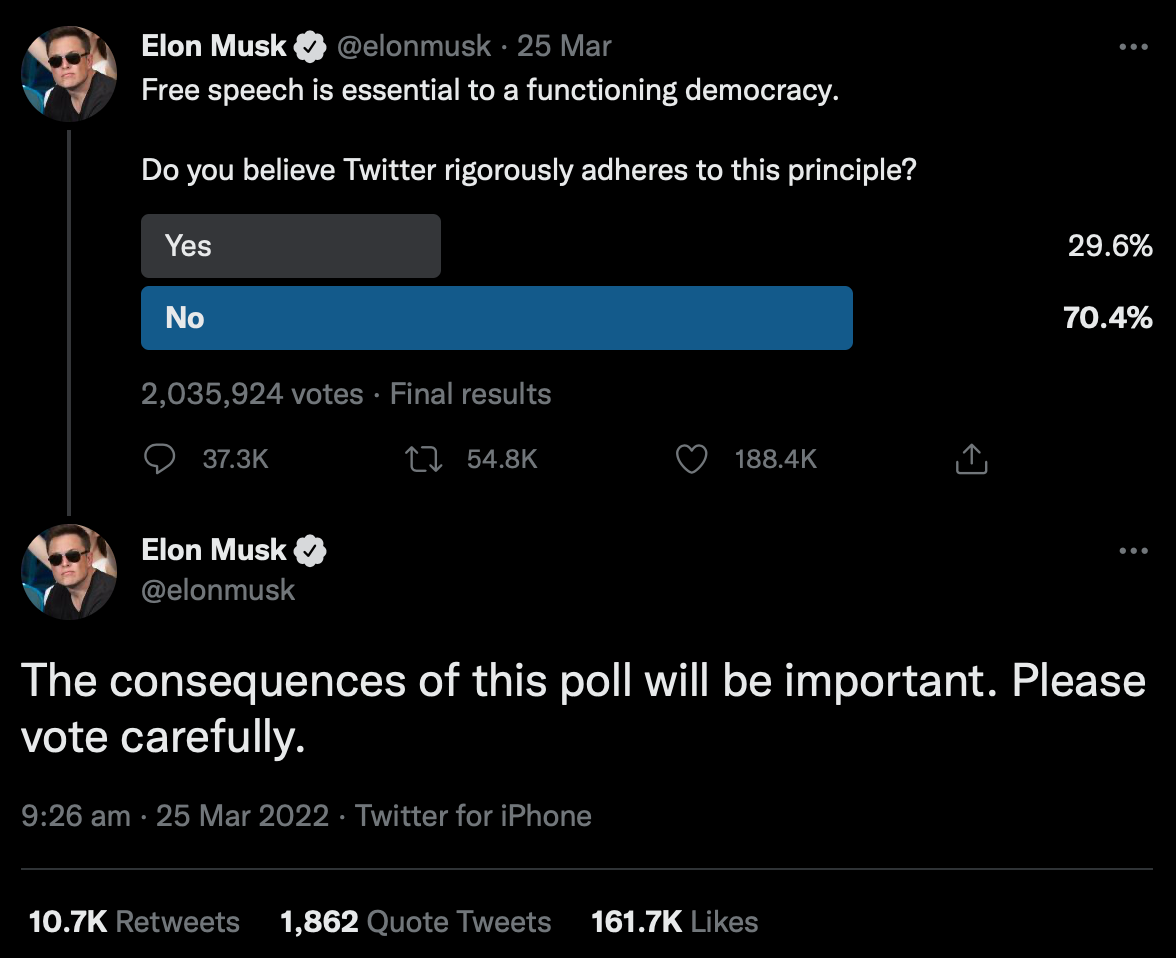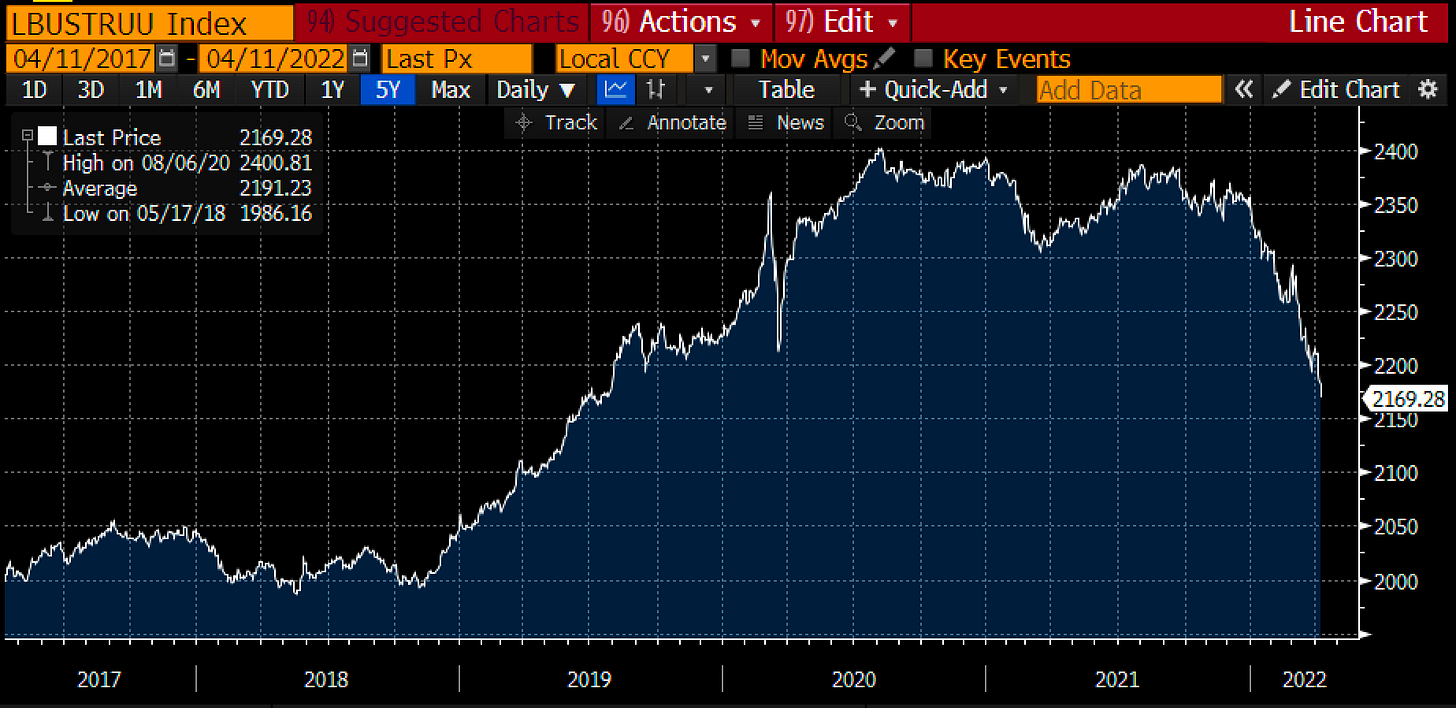Market Mayhem (10/04/22)
New Sanctions, Musk's Stake in Twitter, Buffett's HP Investment, and Rate Impacts plus the Fed Balance Sheet.
The Latest Sanctions
The EU announced more sanctions on Russia this week in response to the apparent massacre of Ukrainian civilians in the town of Bucha. The planned measures include:
A ban on Russian coal imports.
Restricted access to the bloc by Russian carriers unless they transport either food, medicine, or energy.
A complete ban on transactions with four large Russian banks, which include VTB.
A cap on potash imports, which is used in fertilisers and is mostly sourced from Belarus.
A ban on specific Russian and Belarusian goods, such as wood, cement, seafood, and liquor, worth €5.5 billion annually.
The placement of dozens of additional oligarchs, prominent family members, senior officials, and politicians, on a European blacklist.
A ban on exports of high-tech equipment like quantum computers, advanced semiconductors, and sensitive electrical and transport equipment, worth €10 billion annually.
The plan must still be approved by the 27 EU members, and it again excludes oil and gas sanctions. These remain a controversial topic in the EU; nations that are not dependent on Russian oil and gas imports advocate for bans and restrictions, but those that are dependent, such as Austria and Germany, will call for extra time to secure alternative sources. For the latter countries, the pressure is on, as the risk of being vilified if they move at a snail’s pace is real (do you not care to punish war criminals?!). Meanwhile, Putin remains in the precarious position of seeing his grip on European oil and gas, which is his main leverage, erode at an accelerating pace.

However, the ban on coal imports is certainly respectable, even though it will not take full effect until August. European Commission statistics show that the EU imported circa 47% of its coal from Russia in 2019. This implies that significant economic sacrifices are being made to inflict pain on Russia (of course, this does not even approach the sacrifices made by Ukrainians).
“Russia is waging a cruel and ruthless war, not only against Ukraine’s brave troops, but also against its civilian population.”
“It is important to sustain utmost pressure on Putin and the Russian government at this critical point.”
- Ursula von der Leyen, President of the European Commission
The U.S. also announced further punitive measures. These include a complete ban on investment in Russia, more restrictions on Alfabank and Sberbank, and the placement of sanctions on both Putin’s daughters and the family members of other prominent officials.
Musk’s Stake in Twitter
The billionaire-populist Elon Musk reported this week that he owned circa 73.5 million shares of Twitter, which equates to a 9.1% stake. In contrast, Jack Dorsey, the co-founder of Twitter who stepped down as CEO in December, owns only 2.3% of the social media firm. Musk will also take a seat on Twitter’s board for an initial two-year term. In characteristic Musk fashion, the move was precipitated by a democratic, man-of-the-people Twitter post:
Musk filed the form detailing his stake 10 days later than required, and he is already on thin ice with the SEC. In 2018, he posted on Twitter that he had secured funding to take Tesla private at $420 per share, which resulted in an SEC lawsuit that cost him the position of chairman plus a $20 million fine for himself and the EV manufacturer.
It should be noted that Musk, the world’s richest person, filed a passive form with the SEC, which normally indicates that an investor has no interest in initiating overhauls or change at the company in question. But let us be honest; the word passive is the antithesis to Elon’s persona. Musk has also criticised Twitter’s platform on countless occasions.
“He’s both a passionate believer and intense critic of the service which is exactly what we need on @Twitter, and in the boardroom, to make us stronger in the long-term.”
- Parag Agrawal, Twitter’s CEO
Twitter has struggled to produce real growth in the past and its profitability has fluctuated. Personally, I do not know anybody that uses the platform; it seems to be popular only among older celebrities.
Buffett’s HP Investment
Berkshire Hathaway has built an 11% stake in HP Inc. that is worth circa $4 billion. The purchase follows recent investments in the insurer Alleghany Corp. and Occidental Petroleum.
HP is a large, established firm in the business of tech hardware. Buffett has had a tumultuous relationship with tech firms; ventures into IBM and Oracle shares did not work out at all, but his ownership of Apple since 2016 has netted Berkshire a record $32 billion gain. The market value of this stake is now almost $160 billion.
I cannot speculate as to what Buffett and his crew see in HP or what constitutes its moat. The company is certainly nothing like Apple and it appears to have low growth. Following the ‘Buffett spike’ in its share price, HP now trades at a P/E of 10x and P/FCF of 6.5x.
Rate Impacts and the Fed’s Balance Sheet
The Fed hiked the Federal Funds Rate by 25 basis points to range of 0.25-0.5% only three weeks ago, and there are expectations of rapid, further increases. The impact is already visible across diverse markets.
The average rate on fixed, 30-year U.S. mortgages has shot up to 5%, which is almost double the 2.8% rate at the end of 2020.
Naturally, as rates rise, people become reluctant to purchase homes, and that has led to a decline in the market value of construction firms as indicated by the Dow Jones U.S. Home Builders Index.
The Bloomberg U.S. Aggregate Bond Index, which is a benchmark of U.S., dollar-denominated and investment-grade bonds, has also declined. Returns for investors in recent quarters have been the worst since 1980, as discussed in last week’s Market Mayhem.
The yield on short-term U.S. Treasury bonds has also increased substantially.
Besides continued rate hikes, the Fed will now also attempt to shrink its $9 trillion-dollar balance sheet to help limit inflation. In essence, this means that the Fed will attempt to drain money from the system by not reinvesting the principal of maturing bonds and mortgage-backed securities i.e., letting them ‘roll off’.
The U.S. money pump has been active since the subprime crisis, and a previous attempt at quantitative tightening took place in 2018-2019, but rates in an important short-term credit market shot up (the ‘repo crisis’) and so the actions were reversed and postponed.

Fed officials have agreed to shed assets at a rate of $95 billion per month and to build up to this level over three months (May-July).
Rising rates combined with balance sheet reductions are likely to depress the value of financial assets such as stocks in coming months and years. I can only hope that returns will be lower and not disappear entirely.
Other Events
U.S. allies in the International Energy Agency will release 60 million barrels worth of oil reserves.
The Russian central bank has cut its interest rate from 20% to 17% as the Ruble stabilises and the economy deteriorates.











